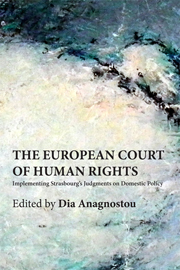Book contents
- Frontmatter
- Contents
- The contributors
- Acknowledgements
- Introduction: Untangling the domestic implementation of the European Court of Human Rights' judgments
- Part I INSTITUTIONAL DYNAMICS OF DOMESTIC IMPLEMENTATION
- Part II LEGAL MOBILISATION AND THE POLITICAL CONTEXT OF IMPLEMENTATION
- 4 European human rights case law and the rights of homosexuals, foreigners and immigrants in Austria
- 5 Political opposition and judicial resistance to Strasbourg case law regarding minorities in Bulgaria
- 6 Under what conditions do national authorities implement the European Court of Human Rights' rulings? Religious and ethnic minorities in Greece
- 7 A complicated affair: Turkey's Kurds and the European Court of Human Rights
- 8 The European Court of Human Rights and minorities in the United Kingdom: catalyst for change or hollow rhetoric?
- 9 Politics, courts and society in the national implementation and practice of European Court of Human Rights case law
- List of European Court of Human Rights judgments and European Commission on Human Rights cases
- Index
5 - Political opposition and judicial resistance to Strasbourg case law regarding minorities in Bulgaria
from Part II - LEGAL MOBILISATION AND THE POLITICAL CONTEXT OF IMPLEMENTATION
Published online by Cambridge University Press: 05 April 2014
- Frontmatter
- Contents
- The contributors
- Acknowledgements
- Introduction: Untangling the domestic implementation of the European Court of Human Rights' judgments
- Part I INSTITUTIONAL DYNAMICS OF DOMESTIC IMPLEMENTATION
- Part II LEGAL MOBILISATION AND THE POLITICAL CONTEXT OF IMPLEMENTATION
- 4 European human rights case law and the rights of homosexuals, foreigners and immigrants in Austria
- 5 Political opposition and judicial resistance to Strasbourg case law regarding minorities in Bulgaria
- 6 Under what conditions do national authorities implement the European Court of Human Rights' rulings? Religious and ethnic minorities in Greece
- 7 A complicated affair: Turkey's Kurds and the European Court of Human Rights
- 8 The European Court of Human Rights and minorities in the United Kingdom: catalyst for change or hollow rhetoric?
- 9 Politics, courts and society in the national implementation and practice of European Court of Human Rights case law
- List of European Court of Human Rights judgments and European Commission on Human Rights cases
- Index
Summary
Judgments of the European Court of Human Rights (hereafter ECtHR or the Court) against Bulgaria have had a significant influence on introducing human rights principles into the domestic legal system since the late 1990s. A main reason for their strong influence was that these judgments substituted for the lack of a domestic human rights tradition. During the fifty years of communist rule, enforcement of individual rights through the courts was practically non-existent. Another reason for the strong domestic influence of the ECtHR's judgments is the lack of an individual complaints procedure before the Bulgarian Constitutional Court, which significantly limits its role in setting basic rights standards. In this barren domestic landscape, the case law of the ECtHR became quickly the major source of human rights law. Its judgments against Bulgaria brought up major human rights issues as well as structural defects in the domestic legal system, like the habeas corpus procedure, the legality and length of pre-trial detention and guarantees for fair judicial proceedings. They also raised a large variety of other issues, reflecting a fundamental divergence between the domestic legal system and European and international human rights law. Above all, these judgments prompted significant changes in domestic law, demonstrating the importance of the Strasbourg tribunal for the incorporation of human rights law in the domestic legal system.
- Type
- Chapter
- Information
- The European Court of Human RightsImplementing Strasbourg's Judgments on Domestic Policy, pp. 122 - 142Publisher: Edinburgh University PressPrint publication year: 2013



